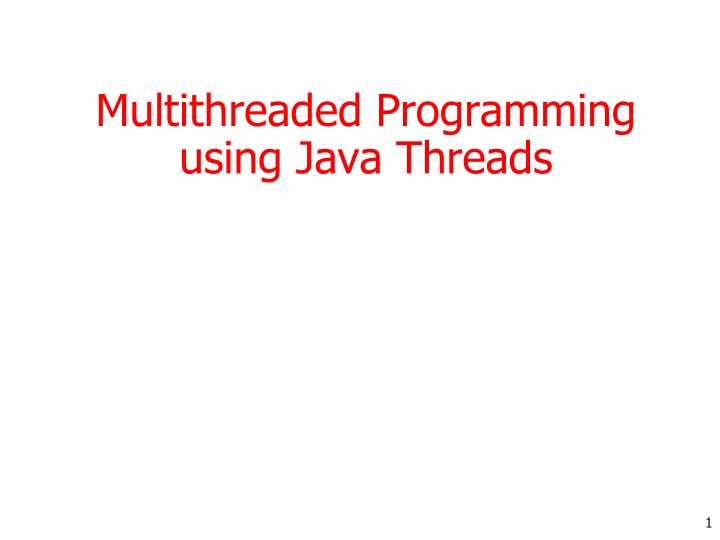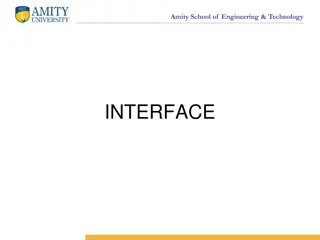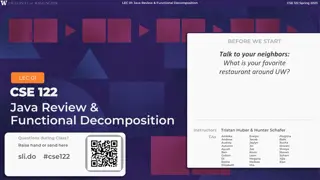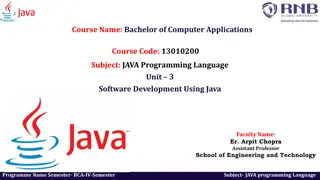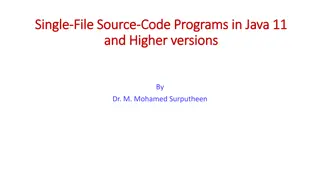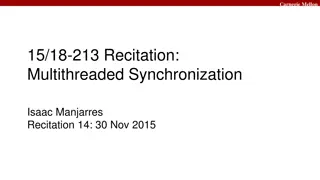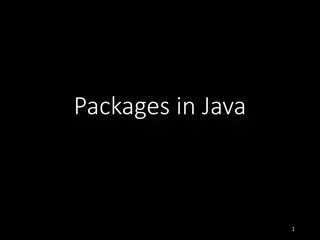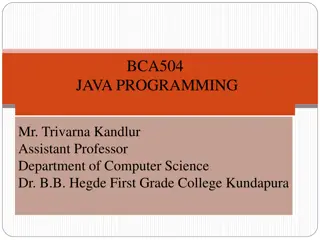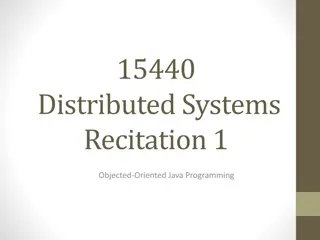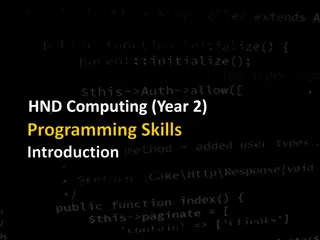Guide to Multithreaded Programming using Java Threads
Explore the world of multithreaded programming with Java threads, covering topics such as defining threads, thread applications, priorities, accessing shared resources, synchronization, and advanced concurrency models. Delve into the differences between multithreading and multiprocessing, and learn about multithreaded servers, single-threaded vs. multithreaded processes, web/internet applications, and the need for threads in modern applications. Discover the benefits of multithreaded/parallel file copy operations and cooperative parallel synchronized threads.
Download Presentation

Please find below an Image/Link to download the presentation.
The content on the website is provided AS IS for your information and personal use only. It may not be sold, licensed, or shared on other websites without obtaining consent from the author.If you encounter any issues during the download, it is possible that the publisher has removed the file from their server.
You are allowed to download the files provided on this website for personal or commercial use, subject to the condition that they are used lawfully. All files are the property of their respective owners.
The content on the website is provided AS IS for your information and personal use only. It may not be sold, licensed, or shared on other websites without obtaining consent from the author.
E N D
Presentation Transcript
Multithreaded Programming using Java Threads 1
Agenda Introduction Thread Applications Defining Threads Java Threads and States Priorities Accessing Shared Resources Synchronisation Assignment 1: Multi-Threaded Math Server Advanced Issues: Concurrency Models: master/worker, pipeline, peer processing Multithreading Vs multiprocessing 2
A single threaded program class ABC { . public void main(..) { .. } } begin body end 3
A Multithreaded Program Main Thread start start start Thread A Thread B Thread C Threads may switch or exchange data/results 4
Single and Multithreaded Processes threads are light-weight processes within a process Single-threaded Process Multiplethreaded Process Threads of Execution Multiple instruction stream Single instruction stream Common Address Space 5
Multithreaded Server: For Serving Multiple Clients Concurrently Server Process Client 1 Process Server Threads Internet Client 2 Process 6
Web/Internet Applications: Serving Many Users Simultaneously PC client Internet Server Local Area Network PD A 7
Modern Applications need Threads (ex1): Editing and Printing documents in background. Printing Thread Editing Thread 8
Multithreaded/Parallel File Copy reader() { writer() { - - - - - - - - - - lock(buff[i]); read(src,buff[i]); unlock(buff[i]); - - - - - - - - - - buff[0] - - - - - - - - - - lock(buff[i]); write(src,buff[i]); unlock(buff[i]); - - - - - - - - - - buff[1] } } Cooperative Parallel Synchronized Threads 9
Levels of Parallelism Code-Granularity Code Item Large grain (task level) Program Task i-l Task i Task i+1 Sockets/ PVM/MPI func1 ( ) { .... .... } func2 ( ) { .... .... } func3 ( ) { .... .... } Medium grain (control level) Function (thread) Threads Fine grain (data level) Loop (Compiler) a ( 0 ) =.. b ( 0 ) =.. a ( 1 )=.. b ( 1 )=.. a ( 2 )=.. b ( 2 )=.. Compilers Very fine grain (multiple issue) With hardware + x CPU Load 10
What are Threads? A piece of code that run in concurrent with other threads. Each thread is a statically ordered sequence of instructions. Threads are being extensively used express concurrency on both single and multiprocessors machines. Programming a task having multiple threads of control Multithreading or Multithreaded Programming. 11
Java Threads Java has built in thread support for Multithreading Synchronization Thread Scheduling Inter-Thread Communication: currentThread yield sleep resume Java Garbage Collector is a low-priority thread. start run stop setPriority getPriority suspend 12
Threading Mechanisms... Create a class that extends the Thread class Create a class that implements the Runnable interface Thread Runnable Thread MyThread MyClass (objects are threads) (objects with run() body) [a] [b] 13
1st method: Extending Thread class Create a class by extending Thread class and override run() method: class MyThread extends Thread { public void run() { // thread body of execution } } Create a thread: MyThread thr1 = new MyThread(); Start Execution of threads: thr1.start(); Create and Execute: new MyThread().start(); 14
An example class MyThread extends Thread { public void run() { System.out.println(" this thread is running ... "); } } class ThreadEx1 { public static void main(String [] args ) { MyThread t = new MyThread(); t.start(); } } 15
2nd method: Threads by implementing Runnable interface Create a class that implements the interface Runnable and override run() method: class MyThread implements Runnable { ..... public void run() { // thread body of execution } } Creating Object: MyThread myObject = new MyThread(); Creating Thread Object: Thread thr1 = new Thread( myObject ); Start Execution: thr1.start(); 16
An example class MyThread implements Runnable { public void run() { System.out.println(" this thread is running ... "); } } class ThreadEx2 { public static void main(String [] args ) { Thread t = new Thread(new MyThread()); t.start(); } } 17
Life Cycle of Thread new start() I/O completed ready resume() Time expired/ interrupted notify() sleeping blocked waiting dispatch sleep() wait() suspend() running Block on I/O completion stop() dead 18
A Program with Three Java Threads Write a program that creates 3 threads 19
Three threads example class A extends Thread { public void run() { for(int i=1;i<=5;i++) { System.out.println("\t From ThreadA: i= "+i); } System.out.println("Exit from A"); } } class B extends Thread { public void run() { for(int j=1;j<=5;j++) { System.out.println("\t From ThreadB: j= "+j); } System.out.println("Exit from B"); } } 20
class C extends Thread { public void run() { for(int k=1;k<=5;k++) { System.out.println("\t From ThreadC: k= "+k); } System.out.println("Exit from C"); } } class ThreadTest { public static void main(String args[]) { new A().start(); new B().start(); new C().start(); } } 21
Run 1 [raj@mundroo] threads [1:76] java ThreadTest From ThreadA: i= 1 From ThreadA: i= 2 From ThreadA: i= 3 From ThreadA: i= 4 From ThreadA: i= 5 Exit from A From ThreadC: k= 1 From ThreadC: k= 2 From ThreadC: k= 3 From ThreadC: k= 4 From ThreadC: k= 5 Exit from C From ThreadB: j= 1 From ThreadB: j= 2 From ThreadB: j= 3 From ThreadB: j= 4 From ThreadB: j= 5 Exit from B 22
Run2 [raj@mundroo] threads [1:77] java ThreadTest From ThreadA: i= 1 From ThreadA: i= 2 From ThreadA: i= 3 From ThreadA: i= 4 From ThreadA: i= 5 From ThreadC: k= 1 From ThreadC: k= 2 From ThreadC: k= 3 From ThreadC: k= 4 From ThreadC: k= 5 Exit from C From ThreadB: j= 1 From ThreadB: j= 2 From ThreadB: j= 3 From ThreadB: j= 4 From ThreadB: j= 5 Exit from B Exit from A 23
Process Parallelism int add (int a, int b, int & result) // function stuff int sub(int a, int b, int & result) // function stuff Data Processor IS1 a b r1 c d r2 add pthread t1, t2; pthread-create(&t1, add, a,b, & r1); pthread-create(&t2, sub, c,d, & r2); pthread-par (2, t1, t2); Processor IS2 sub MISD and MIMD Processing 24
Data Parallelism Data sort( int *array, int count) //...... //...... Processor do dn/2 Sort pthread-t, thread1, thread2; pthread-create(& thread1, sort, array, N/2); pthread-create(& thread2, sort, array, N/2); pthread-par(2, thread1, thread2); IS Processor dn2/+1 dn Sort SIMD Processing 25
Thread Priority In Java, each thread is assigned priority, which affects the order in which it is scheduled for running. The threads so far had same default priority (NORM_PRIORITY) and they are served using FCFS policy. Java allows users to change priority: ThreadName.setPriority(intNumber) MIN_PRIORITY = 1 NORM_PRIORITY=5 MAX_PRIORITY=10 26
Thread Priority Example class A extends Thread { public void run() { System.out.println("Thread A started"); for(int i=1;i<=4;i++) { System.out.println("\t From ThreadA: i= "+i); } System.out.println("Exit from A"); } } class B extends Thread { public void run() { System.out.println("Thread B started"); for(int j=1;j<=4;j++) { System.out.println("\t From ThreadB: j= "+j); } System.out.println("Exit from B"); } } 27
Thread Priority Example class C extends Thread { public void run() { System.out.println("Thread C started"); for(int k=1;k<=4;k++) { System.out.println("\t From ThreadC: k= "+k); } System.out.println("Exit from C"); } } class ThreadPriority { public static void main(String args[]) { A threadA=new A(); B threadB=new B(); C threadC=new C(); threadC.setPriority(Thread.MAX_PRIORITY); threadB.setPriority(threadA.getPriority()+1); threadA.setPriority(Thread.MIN_PRIORITY); System.out.println("Started Thread A"); threadA.start(); System.out.println("Started Thread B"); threadB.start(); System.out.println("Started Thread C"); threadC.start(); System.out.println("End of main thread"); } } 28
Accessing Shared Resources Applications Access to Shared Resources need to be coordinated. Printer (two person jobs cannot be printed at the same time) Simultaneous operations on your bank account. Can the following operations be done at the same time on the same account? Deposit() Withdraw() Enquire() 29
Online Bank: Serving Many Customers and Operations PC client Internet Bank Server Local Area Network Bank Database PD A 30
Shared Resources If one thread tries to read the data and other thread tries to update the same data, it leads to inconsistent state. This can be prevented by synchronising access to the data. Use Synchronized method: public synchronized void update() { } 31
the driver: 3rd Threads sharing the same object class InternetBankingSystem { public static void main(String [] args ) { Account accountObject = new Account (); Thread t1 = new Thread(new MyThread(accountObject)); Thread t2 = new Thread(new YourThread(accountObject)); Thread t3 = new Thread(new HerThread(accountObject)); t1.start(); t2.start(); t3.start(); // DO some other operation } // end main() } 32
Shared account object between 3 threads class MyThread implements Runnable { Account account; public MyThread (Account s) { account = s;} public void run() { account.deposit(); } } // end class MyThread account (shared object) class YourThread implements Runnable { Account account; public YourThread (Account s) { account = s;} public void run() { account.withdraw(); } } // end class YourThread class HerThread implements Runnable { Account account; public HerThread (Account s) { account = s; } public void run() {account.enquire(); } } // end class HerThread 33
Monitor (shared object access): serializes operation on shared object class Account { // the 'monitor' int balance; // if 'synchronized' is removed, the outcome is unpredictable public synchronized void deposit( ) { // METHOD BODY : balance += deposit_amount; } public synchronized void withdraw( ) { // METHOD BODY: balance -= deposit_amount; } public synchronized void enquire( ) { // METHOD BODY: display balance. } } 34
Multithreaded Server Multithreaded Server Server Process Client Process Server Threads Client Process User Mode Kernel Mode Message Passing Facility 35
Assignment 1: Multithreaded MathServer Demonstrates the use of Sockets and Threads sqrt 4.0 A Client Program What is sqrt(10)? Multithreaded MathServer (sin, cos, sqrt, etc.) 2.0 A Client Program What is sin(10)? A Client Program in C What is sin(10)? A Client Program in C++ What is sin(10)? 36
A Multithreaded Program MathThreads start start start MathSin MathCos MathTan join join join MathThreads 37
Thread Programming models Thread concurrency/operation models The master/worker model The peer model A thread pipeline 38
The master/worker model Program Resources Workers taskX Files Databases Master taskY main ( ) Input (Stream) Disks taskZ Special Devices 39
The peer model Program Resources Workers Input taskX Files Databases taskY Disks taskZ Special Devices 40
A thread pipeline A thread pipeline Program Filter Threads Stage 1 Stage 2 Stage 3 Input (Stream) Files Files Resources Files Databases Databases Databases Disks Disks Disks Special Devices Special Devices Special Devices 41
Multithreading and Multiprocessing Deployment issues On Shared and distributed memory systems 42
Multithreading - Multiprocessors Process Parallelism CPU P1 CPU P2 CPU P3 time No of execution processes <= the number of CPUs 43
Multithreading on Uni-processor Concurrency Vs Parallelism Process Concurrency P1 P2 CPU P3 time Number of Simultaneous execution units > number of CPUs 44
Multi-Processing (clusters & grids) and Multi-Threaded Computing Threaded Libraries, Multi-threaded I/O Application Application Application Application CPU CPU CPU CPU CPU CPU Better Response Times in Multiple Application Environments Higher Throughput for Parallelizeable Applications 45
References Rajkumar Buyya, Thamarai Selvi, Xingchen Chu, Mastering OOP with Java, McGraw Hill (I) Press, New Delhi, India, 2009. Sun Java Tutorial Concurrency: http://java.sun.com/docs/books/tutorial/esse ntial/concurrency/ 46
